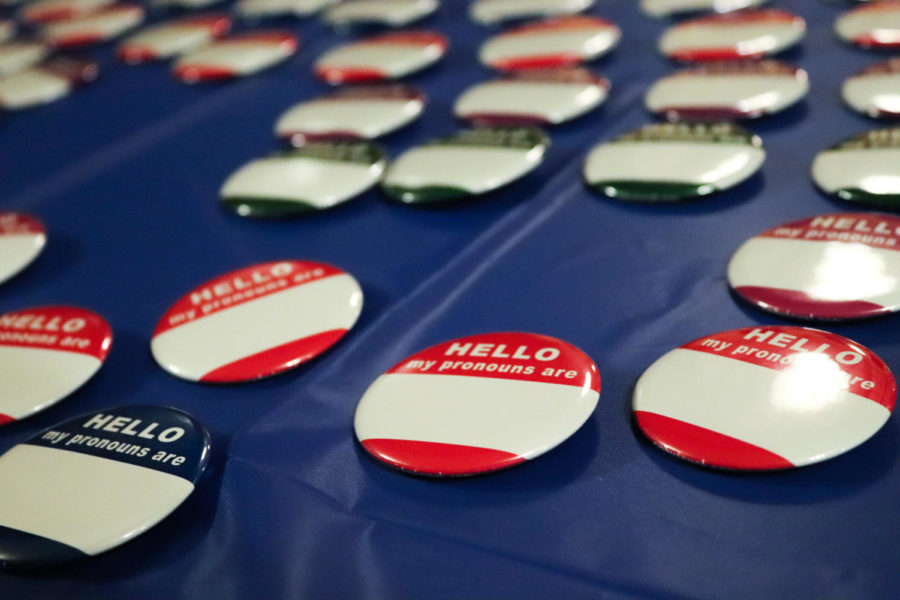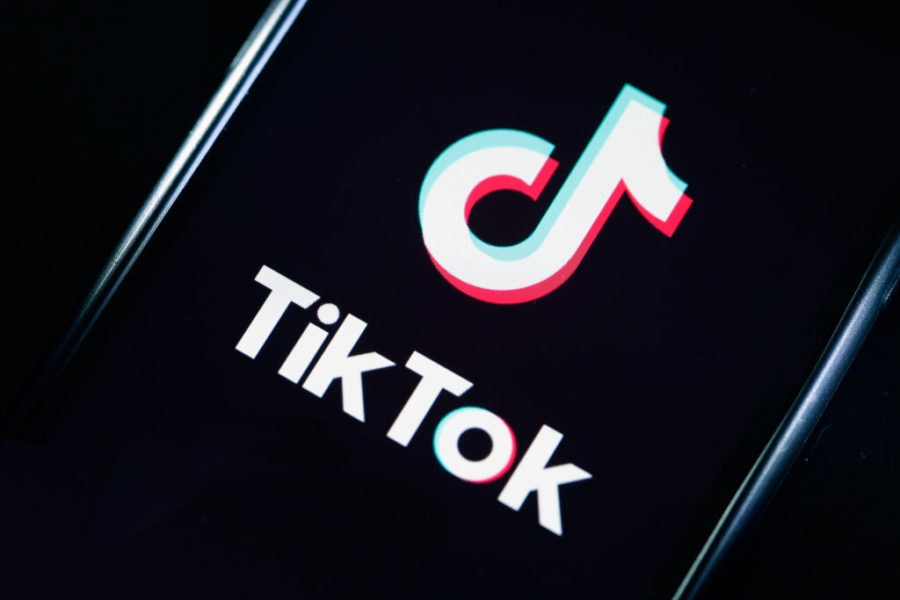Pronoun use creates gender inclusivity
Blank pronoun buttons sit on a table at the LGBTQIA+ Community Welcome Aug. 27 in the Great Hall of the Memorial Union.
February 4, 2020
At Iowa State there are many different people who hold many different identities, however, there is still confusion surrounding the importance of gender identity and the use of pronouns.
This confusion and lack of knowledge and education about gender identity may be connected with a lack of understanding about the term and identity, cisgender, and how it plays a role in the conversation about gender identity.
Cisgender or cis is derived from the Latin word meaning “on the same side.” The identity, cisgender, is for someone who exclusively identifies as their sex assigned at birth. Someone who identifies as cisgender or a cis person is not transgender. According to Trans Student Educational Resources, the term cisgender is not indicative of gender expression, sexual orientation, hormonal makeup, physical anatomy or how one is perceived in daily life.
Andra Castle, assistant director at the Margaret Sloss Center for Women’s and Gender Equity, said the term cisgender is often used as an identity to differentiate from others who identify as transgender. They said it encourages the idea of not just identifying the people who are different, rather creating a more equitable space for everyone.
“By not using the term cisgender, people are setting up the gender binary as a default,” said David Wahl, graduate student in sociology. “Which is insulting and holds ideals that are no longer true about this post-modern world. As well, people don’t realize that by using “cis” you are connecting your gender to your sex. If you just use male or female that doesn’t automatically connect your gender to your sex. So when someone says “well, I’m male,” well yes, that’s your birth sex. How does your gender play into that?”
Brad Freihoefer, director of the Center for LGBTQIA+ Student Success, said by not using the term cisgender there is often a burden placed on transgender, non-binary or gender non-conforming people to have to share their identity, instead of normalizing talking about gender and having the term cisgender really allows that conversation and burden to be opened up and to be shared.
Using the term cisgender also focuses on the importance of cisgender people presenting their pronouns in social, work and personal situations.
Castle said gender expressions like hair and clothing aren’t a reflection of gender identity, so with a lack of presentation of pronouns, it causes assumptions to be made about one’s gender identity. In which those assumptions can be hazardous or detrimental to someone whose gender identity doesn’t match their gender expression. A way this can be prevented is by using pronouns, which ultimately prevent assumptions being made.
As well, by cisgender people presenting their pronouns, it can create an environment that can be very supportive, safe and inclusive for everyone.
Freihoefer said pronouns are a part of a conversation that has to do assumptions and how they are made about someone. When pronouns aren’t shared, assumptions can be made due to gender expression, which is sometimes not accurate to the pronouns someone may use to identify themselves.
“Which is why it’s important that when cisgender folks indicate what pronouns they’re using, we’re having a shared conversation and normalizing the conversation as well,” Freihoefer said.
When having conversations about gender, those who identify as cisgender can acknowledge the privilege that comes with being cisgender to acknowledge the disadvantages transgender and gender non-conforming people face.
Castle said the world of gender is set up and prepared for cisgender people, whereas those who are transgender and gender non-conforming struggle with certain aspects like bathrooms and clothing, where cisgender folks don’t have social conflict with their identity, and experience the world as it is set up for them.
“Just the fact that when we use the word cisgender, folks don’t understand what it means or that it might be a reference to an identity that they hold is apart of cis privilege,” Freihoefer said. “We’ve been normalized that everyone and everything is applied to being cisgender.”
When trying to understand what the identity that cisgender is, and the privilege it holds, there is also controversy over the term “cisgender.”
Castle said the controversy usually happens because of a lack of understanding.
“I usually see people feeling personally attacked when they’re called cisgender, like there is something wrong with them because they’re being labelled and that they have a certain level of privilege because they aren’t experiencing this social conflict of not identifying with the gender they were assigned at birth,” Castle said. “A lot of it has to do with conversation, because often people feel attacked when being called cisgender, which is not the case. There is nothing wrong with being cisgender.”
Freihoefer and Wahl also come to similar conclusions, this controversy is due to ignorance and a lack of education, which sets up the gender binary in which society is trying to escape from.
When talking about different gender identities and pronouns, there is also the conversation about the oppression that comes with misgendering someone by not using correct pronouns.
Wahl said by not using someone’s correct pronouns on purpose, it is an act of aggression people participate in due to ignorance over the subject matter. He said either people are doing it because they’re homophobic or transphobic or because they think it’s a stupid request, however, it is really just an attack on others.
However Castle, Freihoefer and Wahl had a similar conclusion that ultimately, by not using someone’s correct pronouns, it would be like not using someone’s correct name.
“It’s like knowing someone’s name, but you decide that it’s not the name you want to use for that person so you just make up a new name for them,” Castle said. “It just tells someone that you don’t respect them or how they identify.”
With the different ways people misuse pronouns, a conversation can be had on how to improve the use of pronouns.
Castle said when someone is introducing themselves they should mention their pronouns, and if someone is uncomfortable saying it out loud to use pronoun pins. Other common ways to encourage pronoun use is by putting pronouns in email signatures and on name tags. Someone can also put pronouns in ‘about me’ sections or biographies on social and professional scales. Castle said by encouraging pronoun use, it encourages conversation about gender and how it’s used in so many situations.
“Just keep making more conversation about it,” Freihoefer said. “If someone wants to engage, come on in and chat, as well as educate yourself by learning terminology and looking stuff up online.”
Some resources that can be used to learn and talk about gender identity and pronouns are participating in conversation at the Sloss Center and the Center for LGBTQIA+ Student Success, where they provide a safe space to engage in conversation.
People can also check out the Center’s website at https://center.dso.iastate.edu to learn more about pronouns and gender.
People can also use this Pronoun App to practice using different types of pronouns.







